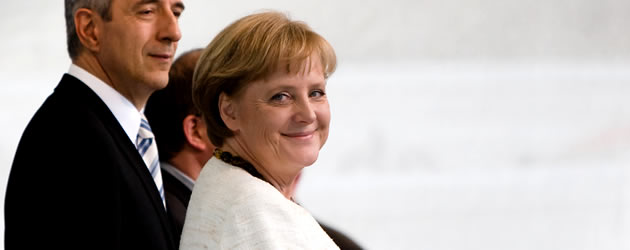Late last night it was announced that German Chancellor Angela Merkel won a landslide personal victory in the latest German general elections. The landmark triumph means that Europe’s ‘Iron Lady’ is only the fourth Chancellor to win a third term in office since the Second World War.
The result, which was seen as positive in terms of stability in Europe and its largest economy Germany, allowed the Euro to appreciated by around 0.2 cents against the Pound and 0.15 cents against the US Dollar.
Merkel received around 42% of the votes, marking her conservative bloc’s strongest score since the re-unification of Germany in 1990. Just shy of the 45% required to hold an absolute majority in the Bundestag lower house of parliament, the impressive turnout reflects positively on Merkel and her handling of the Eurozone debt crisis.
Since November 2005, when Angela Merkel first came into office, the Euro has strengthened by around 20 cents against Sterling. Although, this was largely influenced by the global financial crisis, and the bailout of Britain’s largest banks, markets still consider Merkel a safe bet for ensuring that Europe’s most industrious economy continues to drive the 17-nation bloc back towards sustainable growth.
Sebastien Galy of Societe Generale said that Merkel’s victory provides a much-needed calming influence on financial markets, removing a certain level of uncertainty, following the turbulence of the Syrian conflict concerns and the Federal Reserve’s decision not to taper asset purchases:
“We’ve had a lot of stress and the German election was a significant event. What’s happening is that the memory of all these big shocks is starting to dissipate”.
Markets were hit with a minor shock on Friday as two policymakers at the Federal Reserve hinted that a reduction of asset purchases could still take place in October. James Bullard said that the US Central Bank could very well begin the fabled taper in October if economic conditions are deemed sufficiently strong, noting that “October is a live meeting”.
Esther George further fanned the flames of discontent by suggesting that the Fed has risked putting its credibility in jeopardy by failing to live up to the “costly steps” that were taken to prepare markets for a reduction in asset purchases. The Pound rallied to 1.1860 in reaction to the hawkish Fed sentiments, but GBP/EUR is currently around -0.25 cents lower at 1.1835.
Sterling struck a fortnightly low against the single currency of 1.1814 when Angela Merkel’s election victory was announced.


Comments are closed.